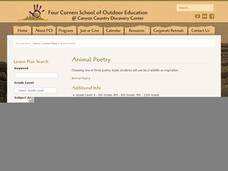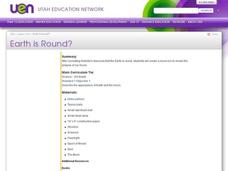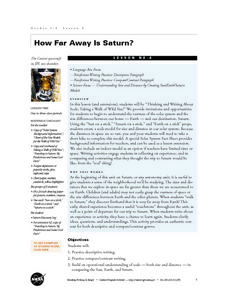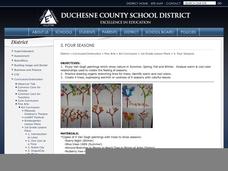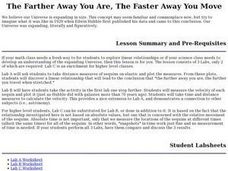Curated OER
Animal Poetry
Fourth graders write poems that use local wildlife as their inspiration. After a class discussion which produces a list of wildlife that pupils have seen in their town, a review of three types of poetry ensues. They look at how haiku,...
Curated OER
Habitable Zones
Students focus on stellar luminosities to estimate size of habitable zones, map out habitable zone around hot light bulbs that serve as models of stars, investigate how size of model "habitable zone" around light bulbs depends on...
Curated OER
My Hometown
Learners identify the basic requirements needed for survival and identify the resouces needed for survival that are found within their own community. They use craft materials to create a model of it and then. create a color key to...
Curated OER
Time Travel to the Edge of the Universe and Back!
Students analyze the size of the universe and calculate the time to travel to near and distant destinations.
Curated OER
A Moon with a View
Third graders explore the rotation of Earth and the moon. In this solar system lesson, 3rd graders participate in an Earth and moon simulation in which part of the class "becomes" the sun, while other children represent the moon by...
Curated OER
MASS
Students distinguish between weight and mass. They examine how in oscillations of a mass against an elastic spring--in the absence of gravity, or in horizontal motion--the length of the oscillation period is proportional to the square...
Curated OER
THE MANY COLORS OF SUNLIGHT
Students examine rainbow components, spectral colors, colors perceived by the eye, hot solids, glowing rarefied gas, absorption, that light is a wave, and optics.
Curated OER
WAVES AND PHOTONS
Learners examine the many types of electromagnetic waves, the concept of an EM wave, how James Clerk Maxwell proposed a slight modification of the equations of electricity, Heinrich Hertz and his radio-frequency, wavelengths, and light...
Curated OER
Earth is Round?
Third graders discuss how Aristotle concluded that the Earth was round. As a class, they review theories about the Earth's shape and describe how life on Earth would be different if it were flat. Individually, they make a moon book in...
Curated OER
The Universe
Students describe what scientists mean by an "expanding universe" in their own words. They explain how scientists comprehend the universie is expanding. Students comprehend the vast scale of the universe. They comprehend how theory...
Curated OER
Sweet Candy Comets
Fourth graders use candy to make a comet. In this lesson, 4th graders examine the role comets have played throughout history, students watch NASA videos about comets and complete the lesson by making an edible model of a comet. This...
Curated OER
What are Stars?
Young scholars research the solar system and it's characteristics. For this solar system lesson, students are broken into 4 groups, each assigned a specific part of the solar system. Young scholars use the Internet to research their...
Curated OER
The Phases of the Moon
Students view an applet to study the phases of the Moon in relation to the orientation of the sun, moon, and Earth.
Curated OER
Using Star Charts and Maps
Students study star charts and describe locations of objects. In this scientific models lesson students use coordinates and identify characteristics.
Curated OER
Astonishing Planetary Discovery
Students access the Internet, research one of the planets, copy and paste necessary information, and design a creature that would survive for a year on their planet. They present their creature and its qualities to the rest of the class.
Curated OER
Exploring The Neighborhood of the Solar System
Students explain why exploring the universe for life on other planets is an important field of study. They use mathematical formulas to calculate the temperatures of planets as it relates to their distance from the sun. Students use...
Curated OER
How Far Away Is Saturn?
Students work together to create a scale model of the solar system. They write a descriptive paper and a paper comparing and contrasting the Earth to Saturn. They discuss their writings with the class.
Curated OER
Four Seasons
First graders examine and describe the characteristics of the four seasons. Using a computer, they write one sentence about each of the four seasons and draws an illustration to accompany it. They present each drawing and sentence to the...
Curated OER
Our Solar System
Learners investigate the coincidental parade of planets and witness dramatic views of the solar system by researching websites and participating in online activities. They write about their findings.
Curated OER
The Night Sky
Third graders develop questions they have about the solar system. After being read a book, they view and discuss different constellations in the sky. In groups, they are given a piece of butcher paper and glow in the dark crayons in...
Curated OER
The Farther Away You Are, The Faster Away You Move
Pupils explore linear relationships. The instructional activity uses science to develop an understanding of the expanding Universe. There are 3 Labs, only 2 of which are required. Lab C is an enrichment for higher level classes.
Curated OER
Sun and Moon Poetry Baskets
Students write Sun and Moon poetry. In this poetry lesson, students research the sun and the moon. They write poetry and create two class baskets for descriptive words about each.
Curated OER
Seeing Interference Fringes with a Telescope
Students construct an interferometer using a simple telescope. In this physics instructional activity, students explain how light waves create the fringe patterns. They observe patterns made by different objects in the sky and compare them.
Curated OER
Time Signifiers - Past or Present Perfect?
Young scholars refine their usage of past simple or present perfect. After a lecture/demo, students work in pairs and utilize a worksheet imbedded in this plan to help them gain practice with time signifiers.
Other popular searches
- Astronomy and Space Science
- Space Science Astronomy
- Space and Astronomy
- Preschool Astronomy/space
- "Astronomy and Space Science
- Astronomy and Space Lesson


